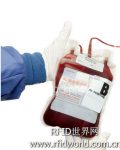
Malaysia National Blood Bank tests RFID system
[ad_1]
Three medical institutions in Malaysia are now jointly testing the application of RFID systems in blood banks.
The University of Malaysia School of Medicine, Penang Adventist Hospital and the National Blood Bank are testing how to use RFID systems to better track blood bags.

Blood bag with RFID tag
This RFID solution BloodBank Manager was jointly developed by Malaysia Siemens Group and Intel MSC after 6 months.
Intel MSC director Atul Bhargava said that the test project started six months ago, and neither company disclosed product development costs.
“We have done extensive investigations and detailed observations on the diagnosis and treatment process of Malaysian medical institutions, including the clinical process of the blood transfusion department and blood center.” said Tan Sri Rainer Althoff, CEO of Siemens Group Malaysia.
This set of solutions will use RFID technology to ensure the transparency and accountability of the blood registration, labeling and tracking process.
The RFID system can also improve the efficiency of identification, inventory management, cross matching and blood bag handling.
In addition, RFID technology can also better manage blood inventories, establish patient data, record blood access, blood donation and transaction records, and blood donor information. BloodBank Manager will introduce system analysis in blood bank management.
In the blood donation process, the RFID system will simplify the registration and blood screening process, thereby reducing the waiting time for patients, reducing the error rate and blood type mismatch rate, and improving the internal processing efficiency of the blood bank.
“Our goal is to install this system in all public and private hospitals in Malaysia,” Althoff said.
[ad_2]



